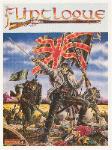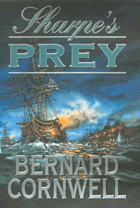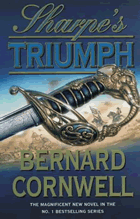Sharke's Abbey
The Battle of Elgin Abbey
A Flintloque Scenario ~ By Felix
Introduction
Flintloque is a fantasy game which has Napoleonic overtones. Orcs are redcoats, the Elves are French, muskets, rifles and swords are the weapons of choice. This scenario, using the rules and figures in the box set, has Lieutenant Sharke and his band of Orc Rifles fighting against a pursuing band of Elven Voltiguers amongst the ruins of an ancient abbey.
Background
In the dark misty lands of south-west Albion lie the hills of Fortunth. In amongst the hills between the river and the forest it is said that a devoutly religious orc by the name of Elgin had a vision (probably something to do with the mushrooms he had just eaten) and news of this vision spread. Hundreds of orcs from across Albion came to the hills of Fortunth, mostly to find and eat the mushrooms, though some, the more devout orcs, came to seek Elgin and his wisdom. With money raised they built a small church, which as time went by became a large abbey. The Abbey of St Elgin became a site of pilgrimage for many orcs, and not all of these were just coming for the mushrooms.
The Abbey of St Elgin had stood for five hundred years, when following a nasty disagreement (something about drinking mushroom soup from the side or front of a spoon), the devotees of St Elgin split.
One thing you can say about religious orcs (obviously there are a lot of things you can say about religious orcs, but you wouldn't do it to their face unless you wanted to be excommunicated and the religious order of St Elgin had a way of dealing with the excommunicated, it involved three barrels of water, a long piece of rope and a teaspoon), where were we, the one thing you can say about religious orcs is that when they disagree they disagree violently. It started off innocently enough with the throwing of bread rolls in the dining hall, but once you start with bread rolls, it's not too long before you go onto chicken legs, then the crockery, tankards of mead and finally the cutlery. Before you can say steak knives, the ceremonial weapons are ripped down from the wall and used in the disagreement. It is said that one orc tried the lift the great sword of Cardinal Tums Backart. Cardinal Backart was a great big fat orc who was not too averse using his great sword on novice priests, who slurped their soup, cutting them into two halves. The great sword was very old, Cardinal Backart had actually won it in a game of cards in a Tavern, and it was never cleaned or oiled, and when you consider the number of food fights in the past and the tankards of mead and glasses of Elven wine thrown in its direction the great sword wasn't in the best of condition. So this orc lifted the great sword and found to his surprise that he only held the handle the rest still bolted to the wall. He didn't look for long as he was struck down by a flying roast hog, spit and all. Once the fighting was over, a lot of dead and dying orcs littered the floor of the Elgin Abbey's dining room and amongst them lay a lot of food. One badly wounded orc, his left leg was missing, was pleasantly surprised to find a whole leg of roast lamb within arm's reach which he started to gnaw.
However this was the beginning of a religious war which lasted sixty-four years. Both sides fought bravely and ferociously (as orcs would). The key strategic target was of course Elgin Abbey. It was taken and lost many times, each time more of the building was damaged and each time it was patched up. Before long most of the abbey was in ruins.
The war finally came to an end at the climax of a fierce battle in which the two opposing Cardinal Generals (the orcs who had started the war were long dead) battled in single combat to the death. As each swung their swords, ducked and dived, after twenty minutes of combat they came to rest with a sword at each others' throats. Both said simultaneously (isn't it nice how these coincidences happen at strategic moments),
"You will eat your soup using the side of the spoon!"
Both looked at each other, realised, hugged and kissed each other on the cheek, then slightly embarrassed, blushed and looked away, it was okay nearly everyone else was dead or dying. During the war both forces could not remember exactly what they were fighting for and they changed their leaders, minds and even changed sides so often that the cause became inconsequential.
Elgin Abbey was never re-built (too expensive) and was left in ruins as a reminder that war could be a problem.
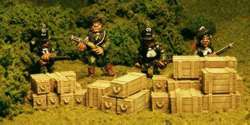 |
This was of no consequence to Lieutenant Sharke of the Orc Rifles, but it did explain why two hundred years after the climatic last battle of Elgin Abbey, Sharke and his small band of Rifles were holed-up in the ruins of the Abbey and there being no hot food available.
Sharke's small unit has been cut off from their regiment following a scouting party (well they were hog hunting, but don't tell the senior officers) by a column of Elven Grenadier Guards. A small platoon of Elven Voltiguers were currently hunting them down, under the command of Major Pointu Orielle. They had chased and hunted Sharke through forests, fields and the odd tavern, never found him in the taverns though. Major Orielle's platoon originally consisted of thirty men it was now down to ten including himself, Sharke's cursed rifles responsible for some of the losses, a few desertions, a few had injuries or fallen ill and returned to the regiment, and one died after eating something he shouldn't have.
Sharke was sick of running away and decided that it was time to make a stand against the cursed Elves, do or die as Wheeling-Turn often said (or was it somebody else, he wasn't sure, but it sounded good).
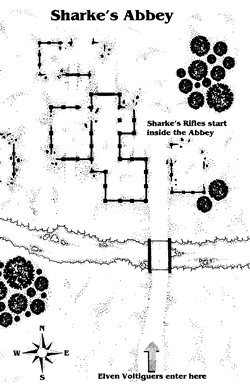 |
Battleground
Elgin Abbey is in ruins, there are various outbuildings (also in ruins) there is some shelter, not much though. To the north-west and south-west of the abbey are a couple of small woods. Running in to the south of the abbey is the River Elgin, which is more of a stream (30% movement modifier). Small rocks and scrubs litter the landscape.
Grendle did make a ruined cathedral, which though not perfect, could be useful. You could make your own ruined abbey, or use a selection of ruined buildings.
Forces
In order to keep things very simple I used the metal figures from the boxed set, six Orc Rifles versus ten Elven Voltiguers. I also used the stats and weapons as given in the main Flintloque rules. The statistics for the Elven Voltiguers were taken from the Sharke's Gold scenario on page 22. Major Pointu Orielle is Experienced and he can be counted as Elite.
Sharke and his Rifles are making a stand and will attempt to fight to the death (yeah right), in reality this means that their northern route is blocked and the only way back to their regiment is by heading south back along the road those Voltiguers have just marched on. So if they can they will attempt to defeat the Elves and ensure that as many Rifles as can get away on the south road.
Rule Change: for the purpose of this battle if any of the Orc Rifles suffers a G result on a Morale Check, instead of routing they will surrender - in the hope that they could eventually escape.
The Elven Voltiguers enter from the south, and are cautious and all their weapons are loaded and primed. Major Pointu Orielle will stay near the back (he has already seen what Sharke and his Rifles can do). Their objective is to kill and/or capture as many as the Rifles as they can. If they can capture Sharke then time to shout hurrah, eat huge amounts of food (with garlic) and buy lots of wine.
Alternatives
A few alternatives to consider really depends on what figures you have in your collection, but here are a few ideas.
Wet & Windy: Change the battle to make it raining, at night and with a strong wind, therefore making it difficult to fire black powder weapons. Add an umpire and hidden movement and you have an entirely different game.
Historical: Flintloque is a fantasy game, but if you have a collection of Napoleonic figures, you could replace the fantasy with historical counterparts (Sharpe instead of Sharke). Maintain the same ratio of six Rifles to ten Voltiguers.
The Elgin Diamond: Sharke has the infamous Elgin Ring which somehow found its way into his haversack, okay so he stole it from the nearest village. So Sharke's Rifles are stuck in the ruins of Elgin Abbey and fifteen Raw Dark Elven Militia descend to take their ring back, they are under the command of their Militia Commander, Juegos Fronteras.
Elgin's Drift: This time a small group of Orc Redcoats (mainly Raw) under the command of Major Arry Arkright have taken shelter in the ruins, but the Voltiguers are trying to sniff them out (which shouldn't be too difficult).
Finally the background the destruction of Elgin's Abbey makes a great background for a more traditional fantasy game, orcs versus orcs - you can even use the same scenery...
Magic & Magical Influences
As you might imagine a religious site such as Elgin's Abbey holds a certain magical power. This can take different forms, for example, one character from each side develops magical powers (see the magic rules in the Flintloque supplement Deadloque).
Certain areas of Elgin Abbey have positive influences and other areas negative influences. These areas of influence will affect the characters when they are firing their weapons, modifying their "to hit" percentage as appropriate.
Again the abbey is surrounded by areas of positive and negative influence, but these cause or heal wounds. It's probably safer to argue that you can not gain more wounds than you started the battle with.
You will probably need an Umpire for these rules or amicable players.
But of course this magic could all be rumours and the abbey has absolutely no influence whatsoever (but as an umpire you don't have to tell the players that, do you?)
Sources
The main inspiration for this article was a visit to Fountains Abbey in North Yorkshire. This ruin (blame it on Henry VIII) set in beautiful grounds, lots of beautiful sunshine really set the scene for Sharke's battle against the Voltiguers in the ruins of Elgin Abbey.


